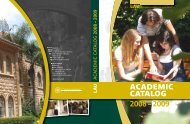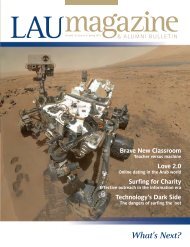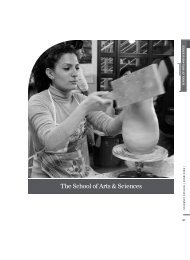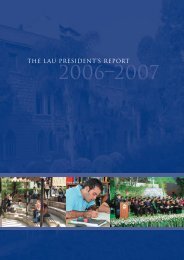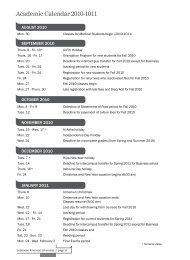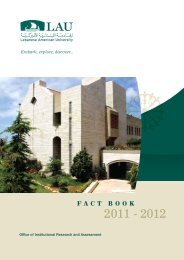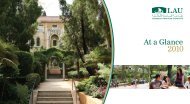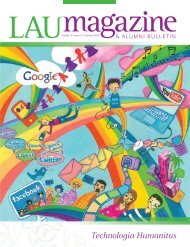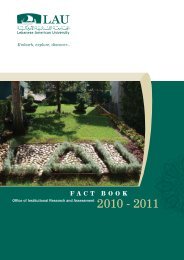academic-catalog2011.. - LAU Publications - Lebanese American ...
academic-catalog2011.. - LAU Publications - Lebanese American ...
academic-catalog2011.. - LAU Publications - Lebanese American ...
You also want an ePaper? Increase the reach of your titles
YUMPU automatically turns print PDFs into web optimized ePapers that Google loves.
Department of Humanities<br />
poverty is emphasized, as is the rise of the<br />
modern banking and investment systems. The<br />
influence of an increasingly globalized world on<br />
production, labor, distribution of wealth, northsouth<br />
dynamics, access to natural resources,<br />
and development is a central theme.<br />
HST401 Special Topics in History [3 – 0]<br />
Some possible topics could include: social<br />
history, oral history, history of slavery, history of<br />
architecture, history of changing tastes, history<br />
of ideologies, history of revolutions, comparative<br />
nationalisms, comparative empire building, cases<br />
of historical decline, and much more. Specific<br />
periods to be covered can also be designated.<br />
HST499 Senior Study [3 – 0]<br />
Every student majoring in history will be required<br />
to take this course in his/her senior year. It is a<br />
3-credit course run seminar-style and entailing<br />
the interactive sharing of independent research<br />
by students working on the topics for their<br />
Senior Studies that have been agreed upon<br />
individually with the professor. Students write<br />
a supervised 40-page Senior Study on a topic<br />
formulated in consultation with a member of the<br />
history faculty.<br />
ITALIAN<br />
ITA 201 Beginning Italian [3-0, 3 cr.]<br />
A beginning course in standard Italian designed<br />
for students who have no previous knowledge<br />
of the language. The course aims at basic<br />
proficiency in the language skills: listening,<br />
speaking, reading and writing focusing on the<br />
use of the Italian sound system, acquisition<br />
of vocabulary and developing standard<br />
grammatical structures, reading of short texts<br />
and writing at the paragraph level. Emphasis<br />
is placed on students’ use of the language in<br />
authentic situations of everyday life beginning<br />
to cultivate an appreciation for the richness and<br />
diversity of the culture. A communicative content<br />
task-based approach is used and opportunities<br />
are given to participate in activities and events<br />
PHILOSOPHY<br />
PHL101 Introduction to Philosophy [3-0, 3 cr.]<br />
This course introduces the major issues and<br />
outlooks in ancient, modern, and contemporary<br />
philosophy.<br />
PHL201 Ancient Philosophy: From the pre-<br />
Socratics to the Epicureans and the Stoics<br />
This course examines the roots of Western<br />
philosophy in Ancient Greece, and serves as<br />
a broad introduction to philosophy. While<br />
emphasis will be placed on the works of Plato<br />
and Aristotle, the renewed appreciation of the<br />
depth of pre-Socratic thought and the value of<br />
post-Aristotelian thought will also be given their<br />
due. In the process, themes such as the origins<br />
of the universe, the nature of reality, the basis<br />
of our knowledge, the good life and society, and<br />
the handling of misfortune will be discussed.<br />
PHL202 Medieval Philosophy: From Plotinus<br />
to Ockham<br />
An examination of the works of major Medieval<br />
thinkers. Special attention will be paid to<br />
the origins of modern philosophy in Medieval<br />
thought, and how Medieval thinking stands<br />
in contrast to Ancient thinking. Also, the<br />
theological character of scholastic thought<br />
will be emphasized, for example: attempts<br />
to reconcile each of Christian and Islamic<br />
teachings with the authority of Aristotle;<br />
attempts to reconcile the benevolence of God<br />
with the existence of evil; attempts to reconcile<br />
the omnipotence of God with presumed limits<br />
placed on his power by “natural laws”; and<br />
attempts to reconcile the omniscience of God<br />
with free will.<br />
PHL203 Early Modern Philosophy: From<br />
Montaigne to Kant<br />
Emphasis will be given to (1) early modern<br />
theories of knowledge (epistemology) against<br />
the backdrop of the Scientific Revolution and<br />
(2) the roots of early modern philosophy in<br />
Renaissance humanism and the outstanding<br />
individuals such as Montaigne who had<br />
contributed to several areas of human<br />
endeavour. In parallel with (1) and (2),<br />
two contrasting approaches to acquiring<br />
knowledge will be studied, one based on<br />
experience (empiricism), the other on reason<br />
(rationalism). Finally, attention will be given to<br />
the significant role of skepticism.<br />
PHL204 Modern Philosophy: From Hegel to<br />
Heidegger and/or Frege to Wittgenstein<br />
Two variants of the course will be offered to<br />
reflect recent realities. The first variant of<br />
the course traces a development from Hegel<br />
through Marx, Kierkegaard, Schopenhauer, and<br />
Nietzsche into 20th Century Phenomenology<br />
and Existentialism. The second variant of<br />
the course will look at the work of Frege and<br />
Russell, and some of their influential 20th<br />
century successors. Within the second variant,<br />
special attention will be given to Wittgenstein,<br />
who was a unique and unclassifiable thinker of<br />
great importance.<br />
ACADEMIC CATALOG [ 2011-2012 ] SCHOOL OF ARTS AND SCIENCES<br />
161



